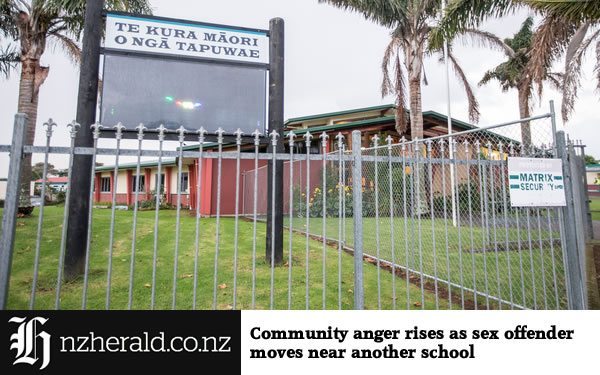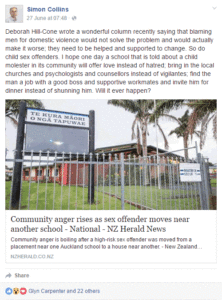NZ Herald social issues reporter Simon Collins posted a story on his Facebook page (June 27) about community backlash when a sex offender was relocated into their community.
His comment finished with the words …
I hope one day a school that is told about a child molester in its community will offer love instead of hatred; bring in the local churches and psychologists and counsellors instead of vigilantes; find the man a job with a good boss and supportive workmates and invite him for dinner instead of shunning him. Will it ever happen?
I’ve met Simon Collins. In my opinion he’s a good man and a balanced journalist, who does his best to present issues fairly. I am certain that like all of us he understands the need to consider issues of safety when relocating sex offenders into the community.
But his question about when will we offer love instead of hatred, and his hope that things would change, struck a chord with me, and prompted me to add this comment …
“I hope so too Simon. But we do need to start asking the really deep questions including the awkward ones about the relevance of God. I was talking one time with a lecturer at Vic Uni (the discussion was about 3 strikes legislation) and he said something that has stuck with me. He said: “If God is love, and love casts out fear (quoting from the Bible), then when a society moves away from God, what this *means* is that it is moving away from love and towards fear. So (he said) we should not be surprised that there is an increasingly punitive attitude in society in the area of criminal justice.
“I think your article illustrates another example of this. People get upset about the failings of Christians and the church, and rightly so. There are many, and we (Christians) have to take responsibility for them. But the picture is not as bad as it is often painted. Most Christians genuinely strive to live by faith as God wants. We know we’re flawed, but churches are still places where people are taught and challenged to love our neighbours, and even to love our enemies, just as Jesus instructed. If we want society’s response to such issues to be more loving, maybe we need to look to where love comes from?”
Our post prompted the following response from another person …
As someone who is no longer a Christian, I find these words strangely uplifting
As I ponder this exchange, a few points stand out to me which I offer for your consideration.
- Social media is a space where people ask some very important questions.
- Many of those question offer opportunities to talk about God and the Church.
- When we talk about God, are people left with a sense that God loves them?
- The last person’s response shows that we can connect with people if we communicate well.
- Being human means we won’t get it right all the time – (we certainly don’t, and this post is not intended as an exercise in self-promotion). But we all still need to be engaged in talking to people about God, whether in social media, or face-to-face.
- It’s great to see a journalist talking about “bringing in the local churches”. Let’s pray that more journalists are willing to name churches as offering solutions to society’s pressing social issues.
- Within our churches, do we talk about society’s pressing issues, and how God would have us respond?
There’s plenty of other questions that could be raised. How about you?
Does your church talk about social issues? Do you talk to others about God, or is this something you find difficult?
Let us know what you think. If you want ideas about resources, or help in any area, please send us an email.










0 Comments